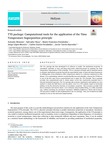TTS package: Computational tools for the application of the Time Temperature Superposition principle

Use este enlace para citar
http://hdl.handle.net/2183/34346
Excepto si se señala otra cosa, la licencia del ítem se describe como Atribución-NoComercial-SinDerivadas 3.0 España
Colecciones
- Investigación (FIC) [1728]
Metadatos
Mostrar el registro completo del ítemTítulo
TTS package: Computational tools for the application of the Time Temperature Superposition principleAutor(es)
Fecha
2023Cita bibliográfica
Meneses, A. et al. (2023) ‘TTS package: Computational tools for the application of the time temperature superposition principle’, Heliyon, 9(5). doi:10.1016/j.heliyon.2023.e15816.
Resumen
[Abstract]: The TTS package has been developed in R software to predict the mechanical properties of viscoelastic materials, at short and long observation times/frequencies by applying the Time Temperature Superposition (TTS) principle. TTS is a physical principle used in material science to estimate mechanical properties beyond the experimental range of observed times/frequencies by shifting data curves obtained at other temperatures relative to a reference temperature in the dataset. It is a methodology related to accelerated life-tests and reliability, whereas the TTS library is one of the first open source computational tool to apply the TTS principle. This R package provides free computational tools to obtain master curves that characterize materials from a thermal-mechanical approach. The TTS package also proposes, implements and explains our own method to obtain the shift factors and the master curve in a TTS analysis, based on horizontal shifting of the first derivative function of viscoelastic properties. This procedure provides shift factors estimates and smooth master curve estimates using B-spline fitting, in a fully automatic way, without assuming any parametric expression. Williams-Landel-Ferry (WLF) and Arrhenius TTS parametric models are also implemented in the TTS package. They can be fitted from shifts obtained by the our first derivative based method.
Palabras clave
Time Temperature Superposition
Thermal analysis
Statistical modeling
R software
Thermal analysis
Statistical modeling
R software
Versión del editor
Derechos
Atribución-NoComercial-SinDerivadas 3.0 España https://creativecommons.org/licenses/by-nc-nd/4.0/
ISSN
2405-8440






